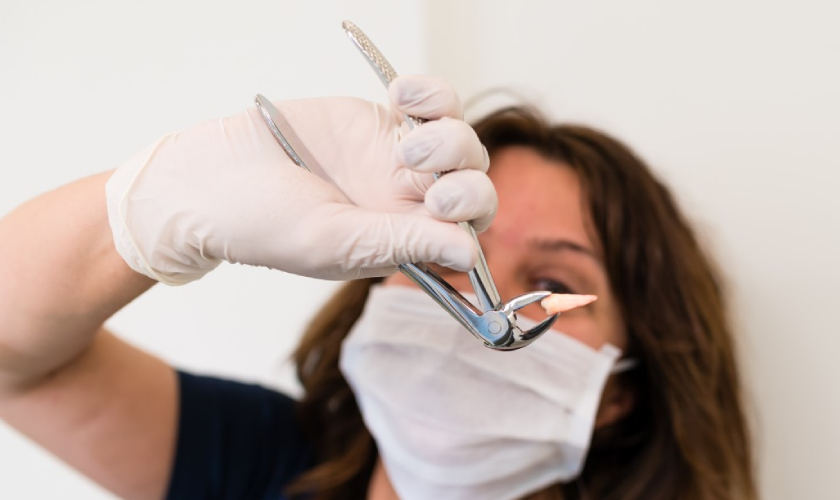It’s important to know what to expect after any surgery to know what to expect and what to be concerned about.The following is a list of important things that might happen after surgery during your wisdom teeth recovery. If you have any questions about what symptoms you’re likely to have, how to prepare for post-operative symptoms, or what symptoms you’re experiencing now, don’t hesitate to contact Berwyn Dental Connection in Berwyn,IL for the best wisdom teeth removal treatment.
Symptoms Post Wisdom Teeth Removal
1. Bleeding
Bleeding is very common after you have your wisdom teeth removed. However, a blood clot must form quickly to start the healing process right away.You should bite down on a wet gauze pad to stop the bleeding if it gets too much. If the bleeding doesn’t stop after 30 minutes, wet a tea bag with cold water and bite down for another half hour. This will help stop the bleeding.
Bleeding can be reduced by sitting upright, not exercising, and not moving near the extraction area. After surgery, a small amount of blood will come out on and off for a few days. But it would be best if you tried to stop this as much as possible.
2. Swelling
The mouth, cheeks, and eyes should swell up. It usually shows up the next day after surgery, and it usually peaks on the second or third day after the surgery.
You can cut down on swelling by first using ice. For the first 24 hours after you get home, put ice on the parts of your face that aren’t in the surgery area. Apply it for 20 minutes at a time and take it off for 10 minutes with something like a soft cloth in between. It’s best not to put the pack right on your face because the cold can hurt your skin.A day and a half after your surgery, you’ll want to start applying a warm, wet cloth to the swollen parts.
3. Pain
The pain will start the same day as your surgery (as soon as the anesthetic begins to subside). The severity and how long it lasts will depend on the person. Take your pain medicine as it has been told you to.
4. Sore throat and trouble swallowing
After some time at home, you may start to feel pain when you swallow and have a sore throat. A lot of people do this. However, it’s not typical to have difficulty breathing.
5. Stiff jaw or a hard time opening your jaw
A stiff jaw is normal when you have surgery on your wisdom teeth. This symptom will also make it hard to open your mouth wide. Warm, moist heat can help loosen your muscles a little, but this symptom will go away over time.
6. Discoloration
You may see your skin turn a different color outside the extraction site. In this area, your skin color may change between two and three days after surgery. Don’t be alarmed.
7. Fever
Please call our office if you have a slight fever the day after surgery. It’s sometimes good to take over-the-counter medicine, but you should check with us first.
8. Lightheadedness
A few days following surgery, take it easy.After all, you did have surgery. As you’ll be lying down a lot while you’re healing, you’ll want to be extra careful when you get up and move around. Moving too quickly can make you feel dizzy.
In the beginning of your recovery, you may have light headedness because you’re taking medication or eating less food.
9. Numbness
Temporary numbness of your lips, chin, or tongue isn’t always bad. Make sure you don’t bite your lip or tongue if you can’t feel them.
10. Nausea
If you have nausea or vomiting after the procedure, don’t eat, drink, or take any medicine for at least an hour. After this, have tea or a soda, like ginger ale. After nausea has gone away, you can take your prescribed medicine.
11. Sutures
Often, stitches are used to help the places where you had your teeth pulled heal faster—the ones we use to break down on their own. The speed at which they do so depends on the person. It can be a few days to a little over a week. If they fall apart before they can dissolve, don’t be afraid. Remove the suture from your mouth and throw it away.
12. Drenched lips
Many people have dry, cracked lips because their mouths are full of gauze. Take care of your lips by using lip balm.
13. Dry Socket
Remember how we talked about how important blood clots are in the healing process? This is the same thing. It happens when a blood clot is broken up or dissolves, exposing the bone and nerves below. There is a good chance it will happen two to three days after the surgery. You’ll know you have one because you’ll have a lot of pain near the surgical site that your pain medicine doesn’t help with. Even your ear may hurt.
The good news is that only about 2 to 5 percent of people have this happen to them. The even better news is that it can be fixed.
14. Holes where your teeth were
Soon, you’ll see a hole where each tooth was removed. The next month or two will see this area grow new tissue. Take care of this area and know that it will grow over time.
Contact our Berwyn Dentist if you are having post wisdom teeth removal complications.

